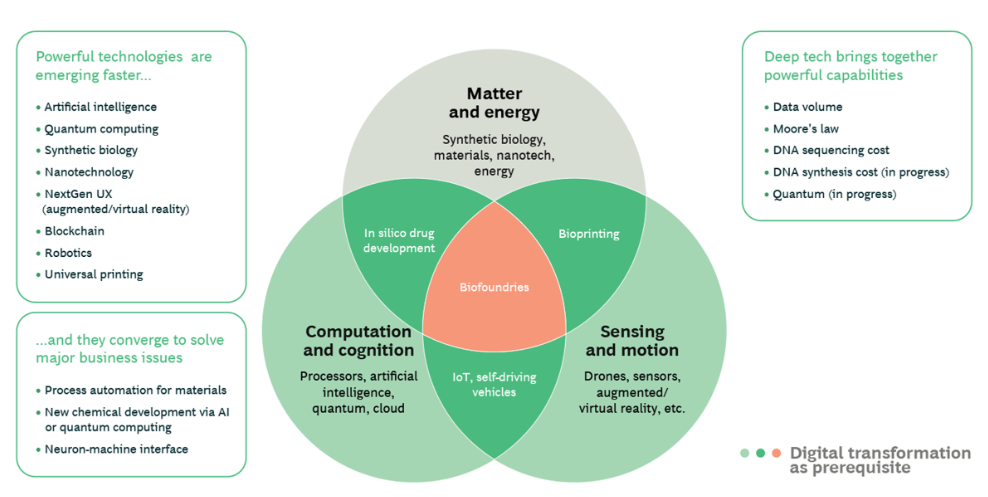What is Convergence of Technologies? Technological convergence has revolutionized the way we live, work, and interact with the world around us.
From the smartphones that have become indispensable tools to the interconnected networks that connect us globally, convergence has transformed various aspects of our lives.
Pakistan, with its dynamic and growing economy, is no exception to this trend.
The convergence of technologies is rapidly reshaping the country’s digital landscape, presenting both challenges and opportunities.
Read More: What is Future of Solana Cryptocurrency?
Driving Forces of Technological Convergence in Pakistan
Several key factors have propelled the relentless march of technological convergence in Pakistan:
- Miniaturization: The remarkable ability to shrink electronic components to unprecedented levels of compactness has enabled the integration of multiple technologies into a single device. This miniaturization has fueled the growth of the mobile phone industry in Pakistan, making smartphones increasingly accessible and affordable.
- Digitization: The transformation of analog information into digital form has facilitated the seamless exchange and manipulation of data across diverse technologies. This digitization has paved the way for the development of digital services like e-commerce, online banking, and e-government services in Pakistan.
- Networking: The establishment of interconnected communication networks, including high-speed internet connections and wireless technologies, has enabled the seamless exchange of data and resources across vast distances. This networking has expanded access to information and communication services, especially in rural areas of Pakistan.
- Software: As the lifeblood of modern technology, software has emerged as the glue that binds together disparate technologies. By providing a common platform for communication and interaction, software has empowered the development of innovative applications and services in Pakistan.
Multifaceted Impacts of Technological Convergence on Pakistan
Technological convergence has yielded a myriad of benefits for Pakistan, transforming various sectors and improving the lives of citizens:
- Enhanced Communication and Connectivity: Convergence has revolutionized communication in Pakistan, enabling instant messaging, video calls, and social media interactions. This has fostered closer connections among individuals and businesses, facilitating collaboration and information sharing.
- Increased Efficiency and Productivity: Convergence has empowered the automation of tasks and the streamlining of processes, leading to significant productivity gains and cost savings across various industries in Pakistan. This has enhanced the competitiveness of Pakistani businesses and improved service delivery in sectors like healthcare and education.
- Unleashed Innovation and Entrepreneurship: Convergence has spurred the development of novel products and services in Pakistan, revolutionizing various sectors and creating new opportunities. This has fostered a vibrant entrepreneurial ecosystem, driving innovation and job creation.
- Financial Inclusion and Access: Convergence has facilitated the expansion of financial services, enabling access to mobile banking, online payments, and other digital financial tools. This has promoted financial inclusion and empowered individuals, especially in underserved areas, to participate in the digital economy.
Addressing the Challenges of Technological Convergence in Pakistan
Despite its transformative potential, technological convergence presents several challenges that need to be addressed to ensure its benefits are maximized:
- Digital Divide: The uneven distribution of access to technology and the internet creates a digital divide, limiting the opportunities for individuals in rural areas and less privileged communities. Addressing this divide requires expanding infrastructure, promoting digital literacy, and ensuring affordable access to devices and services.
- Data Privacy and Security: The interconnectedness of devices and systems raises concerns about the potential for data breaches and unauthorized access to sensitive information. Implementing robust data protection regulations, enhancing cybersecurity measures, and educating individuals about online safety are crucial steps to address these concerns.
- Skilled Workforce and Talent Development: The rapid pace of technological change necessitates a skilled workforce equipped with the necessary digital skills. Investing in education, training, and reskilling programs is essential to ensure that Pakistan has the talent to compete in the global digital economy.
Navigating the Path Forward: A Collaborative Approach
To maximize the benefits of technological convergence while proactively addressing its challenges, Pakistan can adopt a comprehensive and collaborative approach:
- Promote Digital Literacy and Education: Empowering individuals to understand and utilize complex technologies effectively is crucial for bridging the digital divide and fostering inclusive access to the benefits of convergence. Collaborations between government, educational institutions, and technology companies can provide comprehensive digital literacy programs.
- Strengthen Data Protection Regulations and Cybersecurity Infrastructure: Implementing robust data protection regulations and establishing clear guidelines for data collection, usage, and storage can mitigate privacy concerns and protect sensitive information.
Pakistan’s Technological Convergence: A Collaborative Approach
Navigating the path forward effectively requires a collaborative approach that brings together government, industry, academia, and civil society.
Read More: Govt Approves Telecom Infrastructure Sharing Framework
Pakistan can adopt several strategies to maximize the benefits of technological convergence while proactively addressing its challenges:
1. Promote Digital Literacy and Education:
Empowering individuals to understand and utilize complex technologies effectively is crucial for bridging the digital divide and fostering inclusive access to the benefits of convergence. Pakistan can achieve this by:
- Integrating digital literacy into the curriculum at all levels of education: This will equip students with the necessary skills to navigate the digital world and utilize technology effectively.
- Establishing digital learning centers and community hubs: These centers can provide access to computers, internet connectivity, and training programs for individuals in underserved areas.
- Organizing digital literacy workshops and awareness campaigns: These initiatives can educate the public about the importance of digital literacy and the benefits of technology adoption.
2. Strengthen Data Protection Regulations and Cybersecurity Infrastructure:
Protecting sensitive information and ensuring cybersecurity are paramount to building trust in the digital landscape. Pakistan can take the following steps:
- Enact robust data protection regulations: These regulations should outline clear guidelines for data collection, usage, storage, and sharing, ensuring that individuals’ privacy is safeguarded.
- Establish a comprehensive cybersecurity framework: This framework should encompass measures to protect against cyberattacks, including incident response capabilities, threat intelligence sharing, and public awareness campaigns.
- Invest in cybersecurity infrastructure: This includes upgrading outdated infrastructure, adopting advanced security technologies, and training cybersecurity professionals.
3. Foster Innovation and Entrepreneurship:
Technological convergence provides a fertile ground for innovation and entrepreneurship. Pakistan can stimulate these sectors by:
- Establishing technology incubation centers and accelerators: These hubs can provide mentorship, funding, and networking opportunities for aspiring entrepreneurs and innovators.
- Promoting collaboration between academia and industry: Collaborations between universities and research institutions with technology companies can accelerate the development and commercialization of innovative products and services.
- Creating a supportive policy environment for startups: This includes simplifying regulatory processes, providing tax incentives, and facilitating access to funding opportunities.
4. Enhance Digital Inclusion and Accessibility:
Ensuring that all citizens have access to the benefits of technological convergence is essential for inclusive growth and development. Pakistan can achieve this by:
- Expanding broadband infrastructure: This includes deploying fiber optic networks, expanding mobile coverage, and promoting affordable internet access plans.
- Promoting the use of local languages in technology: This includes developing localized content, translating software interfaces, and supporting the development of language-based technologies.
- Designing digital services with accessibility in mind: This means ensuring that technologies are inclusive and accessible to people with disabilities, regardless of their physical or cognitive limitations.
What are Implications for Pakistan: What is Convergence of Technologies?
Technological convergence is having a profound impact on Pakistan, transforming various aspects of society and presenting both challenges and opportunities. Here’s a detailed overview of the implications for Pakistan:
Positive Implications:
- Enhanced Communication and Connectivity: Convergence has revolutionized communication in Pakistan, enabling instant messaging, video calls, and social media interactions. This has fostered closer connections among individuals and businesses, facilitating collaboration and information sharing.
- Increased Efficiency and Productivity: Convergence has empowered the automation of tasks and the streamlining of processes, leading to significant productivity gains and cost savings across various industries in Pakistan. This has enhanced the competitiveness of Pakistani businesses and improved service delivery in sectors like healthcare and education.
- Unleashed Innovation and Entrepreneurship: Convergence has spurred the development of novel products and services in Pakistan, revolutionizing various sectors and creating new opportunities. This has fostered a vibrant entrepreneurial ecosystem, driving innovation and job creation.
- Financial Inclusion and Access: Convergence has facilitated the expansion of financial services, enabling access to mobile banking, online payments, and other digital financial tools. This has promoted financial inclusion and empowered individuals, especially in underserved areas, to participate in the digital economy.
- Improved Governance and Transparency: Convergence is enabling the digitization of government services, making them more accessible, efficient, and transparent. This can lead to improved governance, reduced corruption, and enhanced citizen participation.
- Access to Education and Healthcare: Convergence is expanding access to education and healthcare, particularly in remote areas. Online learning platforms and telemedicine services are bridging the gap and improving the quality of life for many Pakistanis.
Challenges:
- Digital Divide: The uneven distribution of access to technology and the internet creates a digital divide, limiting the opportunities for individuals in rural areas and less privileged communities. Addressing this divide requires expanding infrastructure, promoting digital literacy, and ensuring affordable access to devices and services.
- Data Privacy and Security: The interconnectedness of devices and systems raises concerns about the potential for data breaches and unauthorized access to sensitive information. Implementing robust data protection regulations, enhancing cybersecurity measures, and educating individuals about online safety are crucial steps to address these concerns.
- Skilled Workforce and Talent Development: The rapid pace of technological change necessitates a skilled workforce equipped with the necessary digital skills. Investing in education, training, and reskilling programs is essential to ensure that Pakistan has the talent to compete in the global digital economy.
- Cybersecurity Threats: The increasing reliance on technology exposes Pakistan to various cybersecurity threats, including cyberattacks, data breaches, and malware infections. Strengthening cybersecurity infrastructure, promoting cyber hygiene practices, and fostering international collaboration are crucial to protect against these threats.
- Ethical Considerations: The use of technology raises ethical concerns, such as the potential for surveillance, data manipulation, and algorithmic bias. Establishing ethical guidelines, promoting responsible AI development, and ensuring transparency are essential to address these concerns.
Recommendations: What is Convergence of Technologies?
To maximize the benefits of technological convergence while proactively addressing its challenges, Pakistan can adopt a comprehensive and collaborative approach:
- Promote Digital Literacy and Education: Empowering individuals to understand and utilize complex technologies effectively is crucial for bridging the digital divide and fostering inclusive access to the benefits of convergence. Collaborations between government, educational institutions, and technology companies can provide comprehensive digital literacy programs.
- Strengthen Data Protection Regulations and Cybersecurity Infrastructure: Protecting sensitive information and ensuring cybersecurity are paramount to building trust in the digital landscape. Pakistan can take the following steps:
- Enact robust data protection regulations outlining clear guidelines for data collection, usage, storage, and sharing, ensuring that individuals’ privacy is safeguarded.
- Establish a comprehensive cybersecurity framework encompassing measures to protect against cyberattacks, including incident response capabilities, threat intelligence sharing, and public awareness campaigns.
- Invest in cybersecurity infrastructure, including upgrading outdated infrastructure, adopting advanced security technologies, and training cybersecurity professionals.
- Foster Innovation and Entrepreneurship: Technological convergence provides a fertile ground for innovation and entrepreneurship. Pakistan can stimulate these sectors by:
- Establishing technology incubation centers and accelerators that can provide mentorship, funding, and networking opportunities for aspiring entrepreneurs and innovators.
- Promoting collaboration between academia and industry through collaborations between universities and research institutions with technology companies to accelerate the development and commercialization of innovative products and services.
- Creating a supportive policy environment for startups, including simplifying regulatory processes, providing tax incentives, and facilitating access to funding opportunities.
- Enhance Digital Inclusion and Accessibility: Ensuring that all citizens have access to the benefits of technological convergence is essential for inclusive growth and development. Pakistan can achieve this by:
- Expanding broadband infrastructure through deploying fiber optic networks, expanding mobile coverage, and promoting affordable internet access plans.
- Promoting the use of local languages in technology, including developing localized content, translating software interfaces, and supporting the development of language-based technologies.
- Designing digital services with accessibility in mind, ensuring that technologies are inclusive and accessible to people with disabilities, regardless of their physical or cognitive limitations.
By adopting these comprehensive and collaborative strategies, Pakistan can capitalize on the transformative power of technological convergence while proactively addressing its challenges.
Read More: Pakistan Signs MoU with Saudi in IT Sector
This approach will enable the country to reap the benefits of enhanced communication, increased efficiency, innovation, financial inclusion, and improved governance, paving the way for a more inclusive, prosperous, and digitally connected Pakistan.
Conclusion
What is Convergence of Technologies? Technological convergence is a transformative force that is reshaping Pakistan’s digital landscape, presenting both challenges and opportunities. By adopting a comprehensive and collaborative approach that promotes digital literacy, strengthens data protection, fosters innovation, enhances digital inclusion, and ensures a secure and accessible digital environment, Pakistan can harness the power of convergence to drive economic growth, improve social well-being, and empower its citizens to thrive in the digital age.
Note: The information above might not be accepted 100%. Please verify from your own sources. We will not be responsible for any kind of loss due to our content.
For more news, please visit Munafa Marketing.




